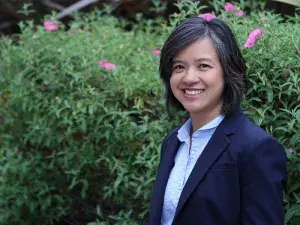
Rhea Kimpo
Associate Professor PhDPrograms and Courses Taught
PM 744 Neuroscience and Clinical Neurology
NURSG 119 Pathophysiology
PHYTH 728 Neuroscience II
About Me
I am passionate about neuroscience, especially the neural mechanisms that control learning and memory. I enjoy teaching how our brains work to students of all ages. I relish investigating best teaching practices that enhance student success. My teaching philosophy revolves around having a growth mindset, actively engaging students, and gathering feedback on my teaching practices. When not teaching, conducting research, or writing a book chapter, I spend my time traveling, going to the opera, swimming, and cycling.
Education
I earned my PhD in Neuroscience from the University of California at San Francisco and completed a post-doctoral fellowship at Stanford University. I received my BA in Molecular and Cell Biology from the University of California at Berkeley.
Teaching Interests
My teaching interests are in neuroscience, neuroanatomy, physiology, and pathophysiology.
Scholarly Interests
I am interested in linking the neuroscientific principles of learning and memory to teaching and learning in the classroom. My expertise in the neurobiology of learning and memory has led me to conduct research on teaching practices that enhance students’ learning and retention of course material. My research studies include 1) comparing the effectiveness of puzzle-based vs. traditional lecture, as used during exam review sessions, on students’ performance, 2) using artificial intelligence to identify positive deviant behaviors of at-risk students who pass their board exams on their first try, and 3) establishing best teaching practices in teaching anatomy using iPads.
Publications
Kimpo RR* and Puder B* (2023). A Neuroanatomy Lab Practical Exam Format in Alignment with the Universal Design for Learning Framework. Anat Sci Educ. 00: 1-12. https://doi.org/10.1002/ase.2316
Harrison CD, …Kimpo RR, …, and Tanner KD (2019). Investigating Instructor Talk in Novel Contexts: Widespread Use, Unexpected Categories, and an Emergent Sampling Strategy. CBE Life Sci Educ. 2019 Sep;18(3):ar47. doi: 10.1187/cbe.18-100215. PMID: 31469624
Owens MT, …Kimpo RR, …, and Tanner KD (2017). Classroom sound can be used to classify teaching practices in college science courses. Proceedings of the National Academy of Sciences U S A. 2017 Mar 21;114(12):3085-3090. Epub 2017 Mar 6. PMID: 28265087
Nguyen-Vu TB, Zhao GQ, Lahiri S, Kimpo RR, Lee H, Ganguli S, Shatz CJ, Raymond JL (2017). A saturation hypothesis to explain both enhanced and impaired learning with enhanced plasticity. Elife. 2017 Feb 24;6:e20147. PMID: 28234229 Contribution: research design, data collection and analysis, manuscript writing
Katoh A, Shin S-L, Kimpo RR, Rinaldi JM, and Raymond JL (2015). Purkinje cell responses during visually and vestibularly driven smooth eye movements in mice. Brain Behav. 2015 Jan 21:e00310. PMID 25642393.
Kimpo RR*, Rinaldi JM*, Kim CK*, and Payne HL*, Raymond JL (2014). Gating of neural error signals for motor learning. Elife. 2014 Apr 22;3:e02076. PMID 24755290.
Nguyen-Vu TDB*, Kimpo RR*, Rinaldi JM, Kohli A, Zeng H, Deisseroth KD, Raymond JL (2013). Cerebellar Purkinje cell activity drives motor learning. Nature Neuroscience 16(12):1734-6. Epub 2013 Oct 27.2013 Oct 27. PMID 24162651 [Recommended in Faculty of 1000 by Reza Shadmehr, PhD]
Kimpo RR and Raymond JL (2007). Impaired motor learning in the vestibulo-ocular reflex in mice with multiple climbing fiber input to cerebellar Purkinje cells. Journal of Neuroscience 27(21):5672-82. PMID 17522312.
Kimpo RR*, Boyden ES*, Katoh A, Ke MC, and Raymond JL (2005). Distinct patterns of stimulus generalization of increases and decreases in VOR gain. Journal of Neurophysiology 94(5):3092-100. Epub 2005 Jul 20. PMID 16033945. Kimpo RR, Theunissen FE, and Doupe AJ (2003). Propagation of correlated activity through multiple stages of a neural circuit. Journal of Neuroscience 23(13):5750-61. PMID 12843279.
Professional Affiliations & Memberships
Society for Neuroscience Molecular and Cellular Cognition Society
Community Service
Member and former Co-chairperson, Faculty Development Committee Member, The SMU Institute for Artificial Intelligence in Health Sciences Education Master Trainer, Connect 2 Success, CIEL Consultant, Scholarship of Teaching and Learning, A&II Workshop leader, Brain Awareness Outreach Program for K-8
Honors & Awards
Faculty Scholarship Grant Program, SMU (2020, 2019) Improving Teaching with Technology Grant, SMU (2018, 2017) NINDS K01 Career Development Award to Promote Diversity in Neuroscience Research (2014)